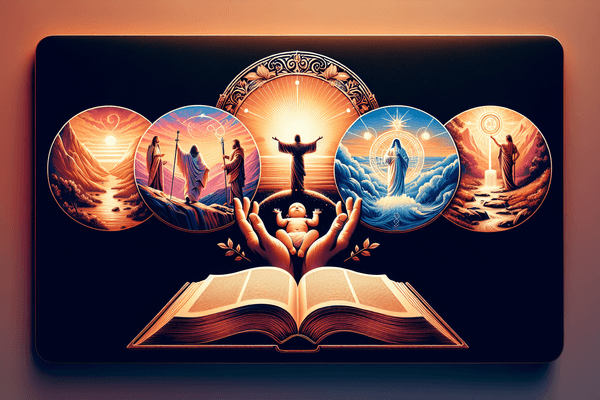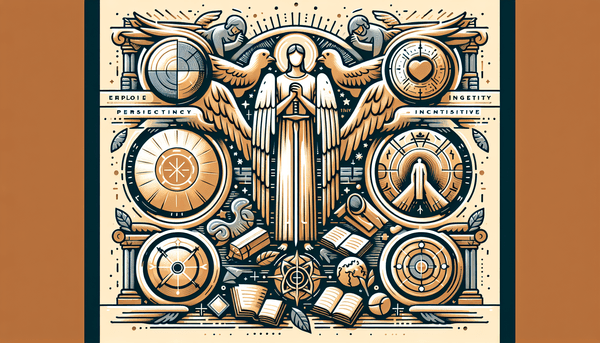The Representation of Beauty in the Bible
Beauty in the Bible is often depicted as a reflection of God's artistry and perfection. In the poetic language of the Psalms, beauty is likened to a flock of sheep, a symbol of abundance and nourishment, as in Psalm 91:11, 'Your beauty is like a flock that ranges over the mountains; goats yielding milk for my people.' This imagery speaks to the admiration of the natural world and the provision of God. The scriptures also emphasize inner beauty, as Proverbs 31:30 counsels that 'Charm is deceitful, and beauty is vain, but a woman who fears the Lord is to be praised.' The Song of Solomon offers a romantic perspective, celebrating physical beauty alongside character, 'For you are beautiful, my love, behold, you are beautiful! Your eyes are like the dawn, enrapturing; your nose is like the tower of a great city' (Song of Solomon 5:10). These verses remind us of the multifaceted nature of beauty, inviting us to appreciate both the aesthetic and the spiritual.
The Role of Parents in Spiritual Education
Scripture places a significant emphasis on the role of parents in the spiritual education of their children. The Old Testament instructs the Israelites to 'teach them [God's commandments] diligently to your children' (Deuteronomy 6:6-7), emphasizing the importance of imparting faith and values from an early age. The wisdom literature of Proverbs reinforces this idea with the well-known proverb, 'Train up a child in the way he should go; even when he is old he will not depart from it' (Proverbs 22:6). In the New Testament, the Apostle Paul advises parents to 'bring them up in the discipline and instruction of the Lord' (Ephesians 6:4). These verses collectively underscore the lifelong impact that early spiritual guidance can have, shaping the next generation to carry forward the mantle of faith.
Understanding Triumph Through Biblical Narratives
Triumph is a recurring theme in the Bible, symbolizing the ultimate spiritual victory that is found in God. The New Testament recounts the triumphal entry of Jesus into Jerusalem as a fulfillment of prophecy, marking the beginning of a sequence that would culminate in Jesus' victory over sin and death. This act of triumph is an echo of the divine plan for humanity, as expressed in scriptures such as 2 Corinthians 2:14, 'But thanks be to God, who in Christ always leads us in triumphal procession.' This victory is not only a historical event but also a present reality for believers, as Romans 8:37 reassures us, 'In all these things we are more than conquerors through him who loved us.' Such passages offer a perspective of hope and assurance, reminding us that triumph is woven into the fabric of God's kingdom.
The Oneness of God and the Power of His Word
The Bible presents a consistent message of the oneness of God, beginning with the Shema of Deuteronomy, 'Hear, O Israel: The Lord our God, the Lord is one' (Deuteronomy 6:4). This foundational truth is further revealed in the New Testament, where Jesus assures his followers, 'I have overcome the world' (John 16:33), offering solace amidst tribulation. The pursuit of divine wisdom is encouraged throughout scripture, with Proverbs 2:6 stating, 'For the Lord gives wisdom; from his mouth come knowledge and understanding.' This invitation to seek understanding reflects a God who desires an open dialogue with His creation, as exemplified in Matthew 7:7-8, 'Ask, and it will be given to you; seek, and you will find; knock, and it will be opened to you.'
Conclusion
The journey through these biblical themes reveals the multifaceted nature of scripture and its relevance to our lives. From the beauty that surrounds us to the sacred task of parenting, from the promise of triumph to the assurance of deliverance, and from the proclamation of God's unity to the power of His word, the Bible offers guidance, comfort, and wisdom. As we engage with these themes, we are invited to reflect on their implications, to incorporate their truths into our daily walk, and to be transformed by the profound depth of God's eternal word. This journey is not just about understanding but also about cultivating a heart of gratitude and godliness, as explored in our companion article.
FAQ
Q: What did the prophet Nathan say about David's future?
A: The prophet Nathan delivered a message from the Lord to David, which included a prophecy about David's future in 2 Samuel 7:16, 'Your house and your kingdom will endure forever before me; your throne will be established forever.' This prophecy foretold the establishment of David's lineage and the eternal kingdom of the Messiah, Jesus Christ, who would come from the line of David.
Q: What is the significance of Jesus' triumphal entry into Jerusalem?
A: The triumphal entry of Jesus into Jerusalem, as recounted in the Gospels, signifies the fulfillment of Old Testament prophecy and the inauguration of Jesus' kingship. It marks the beginning of the events leading to His crucifixion and subsequent resurrection, symbolizing His victory over sin and death and establishing the framework for the eternal kingdom of God.
Q: How can parents impart spiritual education to their children?
A: Parents can impart spiritual education to their children by teaching them God's commandments diligently, modeling a life of faith, and nurturing them with love and discipline according to the principles found in the Bible, such as those outlined in Deuteronomy 6:6-7, Proverbs 22:6, and Ephesians 6:4.
Q: What does the Bible say about the beauty of a woman?
A: The Bible speaks of a woman's beauty in various passages, emphasizing both her physical attractiveness and her inner qualities. Verses like Psalm 91:11, Proverbs 31:30, and Song of Solomon 5:10, use poetic language to celebrate the beauty of a woman, highlighting the importance of godliness and character alongside physical appearance.






